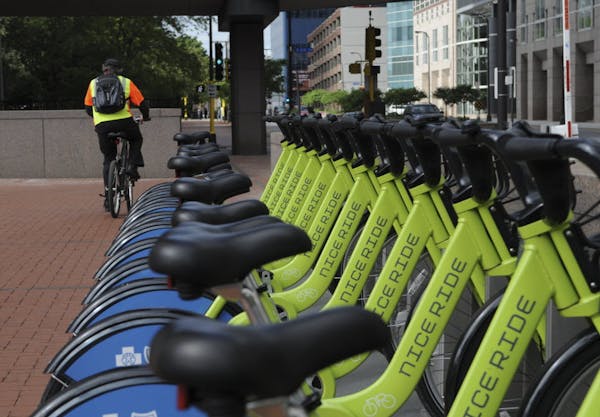Come late summer, a new generation of bike-sharing will arrive in Minneapolis.
Some 1,500 new blue dockless bikes will hit the streets, complementing the existing lime-green Nice Ride Minnesota fleet, which is already 1,850 cycles strong.
It's all a part of Nice Ride's transition to a dockless bike-share system, a two-wheeled transportation trend playing out across the country — with mixed results.
But local cycling advocates say the new system has the potential to reach even more cyclists.
"It's all about more people accessing bikes, and you can only access bikes if they're in your neighborhood," said Ethan Fawley, executive director of Our Streets Minneapolis.
Currently, Nice Ride bikes are available to rent and park from more than 200 stations across Minneapolis and St. Paul, an arrangement that will be phased out in 2021.
Under the dockless method, bikes will be available at more than 500 "virtual parking zones" — sort of like parking spaces for bikes — throughout Minneapolis, greatly expanding their availability. Cyclists in need of wheels may consult their smartphones to locate bikes, and then leave them locked in a zone at the end of their trip.
But just in Minneapolis — for now. St. Paul has opted to explore a dockless bike system on its own, and city officials there are currently reviewing proposals. Golden Valley and Edina are among a growing number of suburbs eyeing dockless bike systems, too.
Nice Ride General Manager Melissa Summers says the new system will be more economical to operate and provide cyclists greater flexibility. She predicts Nice Ride zones will be "as ubiquitous as bus stops."
Wider availability
While Nice Ride's popularity has grown since the system's launch in 2010, a new dockless model has emerged in recent years. Now, most major U.S. cities are experimenting with dockless bike sharing, with some permitting bikes to be parked anywhere.
As a result, photos of dockless bikes parked in unusual places — submerged in lakes, crafted into artwork, in subway stations, and abandoned in tangled piles — are ubiquitous on the internet. Numerous Twitter accounts (such as Dockless Bike Fail @docklessbike) have cropped up. The situation in Dallas has an Instagram account called @dallasbikemess.
Theft of the bikes has proved to be an issue in some cities, as well, although Summers points out that few Nice Ride bikes go missing.
Minneapolis is trying a different strategy, requiring users of dockless bikes to return them to the virtual parking zones, which could be marked sidewalk or pavement. Nice Ride is working with the city and the park board, the University of Minnesota, and urban planning leaders to identify locations for the new zones, all of which will be detailed on an overhauled website and mobile app.
Dockless bikes will be outfitted with GPS technology and special sensor, so if a bike is left beyond designated zones or is parked tipped over, it can be located. On Tuesday, New York-based Motivate International Inc., the largest bike-share firm in North America, began operating Nice Ride, and Blue Cross and Blue Shield will remain a sponsor.
Eventually, Nice Ride may feature electric bikes and a winter bike program, but scooters are not currently being considered.
U student Noah Hansen said he's "super excited" about dockless bike sharing. The Andover resident uses his car, public transit and Nice Ride to travel about the Twin Cities. "Sometimes biking is the fastest way to get somewhere, but I may have to walk five or six blocks to get to a [Nice Ride] station," he said.
Price changes
Nice Ride also announced that it is lowering the price of single rides by a dollar to $2 when purchased at a station, and $1 through the Nice Ride bike share app. User fess will also be lowered to $2 per half-hour. Nice Ride is also working on a system where Metro Transit passes could be used as payment in the future.
Nice Ride says the dockless program will formally begin in late August or early September, depending on when bikes arrive from Thailand, where they're being built. Summers said all the new bikes will be checked thoroughly before beginning service.
Meanwhile, Golden Valley and Edina have struck an agreement on a trial basis with another bike-sharing firm called LimeBike, based in the San Francisco Bay Area.
The pilot program officially began June 1 and runs through the end of the year, but the bikes have not yet arrived in either suburb. City officials say LimeBike has cited difficulty in hiring staff as a reason behind the delay.
"We're hoping it's soon," said Mark Nolan, Edina's transportation planner. "We don't want to lose too many of the summer months here, when we think we'll get the most use."
Staff writer Hannah Covington contributed to this report. Janet Moore • 612-673-7752 @MooreStrib
U.S. Steel won't get exception to pollution rules that protect wild rice, MPCA says

Taste of Minnesota to be enjoyed on the ground and in the air this year

Ex-Hennepin sheriff paid for drunk-driving damages with workers' comp

Souhan: This is KAT's chance to prove Flip Saunders was right

